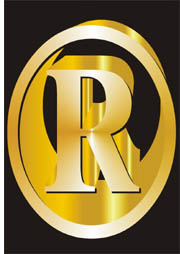Should you Register a Trademark?
To register a trademark is the best way to claim and
protect your legal rights in a mark.
Once registered, no one can claim ignorance of your mark, since the onus is on subsequent users to do applicable trademark searches.
You are not obliged to register a trademark, but if you do not and should a dispute arise it is more difficult to prove your ownership of a mark based on common law rights.

Trademark Registration offers distinct advantages:
- Your rights are established sooner and are easier to protect and enforce than acquiring rights through use.
- You may sue for infringement in Federal Court.
- You can claim damages - especially in the case of counterfeit goods.
- If you register a trademark in one country it can be the basis for obtaining registration in other countries.
- Registered trademarks can have a value which can be assigned, licensed, franchised or serve as security for loans.
- You may use the ® notice.
- A mark registered on the U.S. principal register may be filed with the US Customs and Border Protection Agency as protection against the importation of counterfeit goods.
- You can defend your trademark against its use as an internet domain name by a third party.
Before you register a trademark, refer to the additional information on how to choose a strong mark, doing a search and completing the application.
The Trademark Registration Process
After receipt of your trademark application, the Trademarks Office will begin their examination, which can take a number of months.
The Examining Registrar must be satisfied that the application complies with all applicable rules. Any queries, endorsements, limitations or corrections required will be communicated to the applicant, who must respond within a certain time limit.
Once all objections have been overcome an acceptance will be issued and notice will be published in the Official Gazette or Journal.
At this stage, third parties may oppose the application within a certain time - or request to extend the time to oppose.
If no party is successful in opposition, a registration certificate will be issued.
How to Register a Trademark Internationally

Registration of a trademark in one country does not automatically offer protection worldwide.
However, a lot of countries signed the Madrid Protocol, administered by the International Bureau of WIPO. A single application can be filed through them to seek protection in designated countries.
You can also apply for a European Community Trademark with OHIM (the Office for Harmonisation in the International Market).
Please Note:
Links to these and other helpful trademark web sites are
available on our Intellectual Property page.
You may need to register your mark in more than one class and a fee is payable in each class that you wish to register.
It does not necessarily mean that should you not register your mark in a specific class, that someone else may register a mark similar to yours in that class.
The criteria applied by the Trademarks Office would be whether there is a "likelihood of confusion" on which to base a decision.
The trademark registration process may seem to be expensive, but if you consider the commercial value that a mark may accrue, the money is well worth it.
The process to register a trademark can be lengthy. It is therefore important to conduct a thorough search of existing trademarks and submit a properly completed application. A trademark attorney can ensure that you do not need to repeat the process!
You are here:







